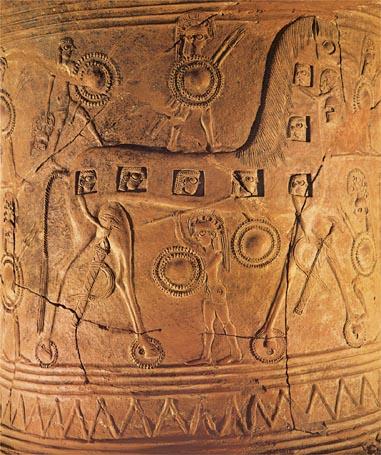Classical Records and German Origins, Index
Six essays and corresponding audio presentations explaining the origins of the Germanic people, from the Classical historians, archaeology and other resources.
Six essays and corresponding audio presentations explaining the origins of the Germanic people, from the Classical historians, archaeology and other resources.
In the preface to Josephus’ Wars, the historian explains that he originally wrote the book in “the language of our country”, i.e. Hebrew or perhaps Aramaic, and sent it to the “Upper Barbarians”, among whom he then names as “the Parthians ... Babylonians ... remotest Arabians ... and those of our nation beyond Euphrates, with the Adiabeni.”
Except for the Parthians, Josephus’ designations here are geographical, where it is clear from the pages of his Antiquities that many of the Israelites of the Babylonian deportation still dwelt around Babylonia in his time (15.3.1), and this would include the “remotest” part of Arabia adjacent to Babylonia (cf. Acts 2:11; 1 Pet. 5:13). Also, Josephus attests that many Israelites of the Assyrian deportations were “beyond Euphrates until now”, where they were “an immense multitude, and not to be estimated by numbers” (11.5.2). Adiabene is that part of Assyria which, according to Strabo in his Geography, is not in Mesopotamia but which consists of the plains beyond the Tigris bordering Babylonia to the south and Armenia to the north (16.1.1, 19). Media borders Adiabene on the east.

 The purpose of this exposé is to show how, if one is not familiar with secular history (of which much is found in the Greek Classics), one will not fully understand Scripture. The Judaean nation comprised mostly of “bad figs” (today called “Jews”) was not dispersed until 70 A.D., as prophesied at Jer. 24:8-10, 26:6, 29: 17-19 et al., affirmed by Christ Himself at Luke 21:24. While James at 1:1 speaks of the “twelve tribes which are scattered abroad”, and James died before 70 A.D., as Josephus attests, James was not addressing the so-called “Jews” dispersed in 70 A.D., and neither could the “Jews” already spread abroad claim descent from tribes other than three only, Judah, Benjamin and Levi, and only a tiny fraction of those resettled Judaea on their return from Babylon.
The purpose of this exposé is to show how, if one is not familiar with secular history (of which much is found in the Greek Classics), one will not fully understand Scripture. The Judaean nation comprised mostly of “bad figs” (today called “Jews”) was not dispersed until 70 A.D., as prophesied at Jer. 24:8-10, 26:6, 29: 17-19 et al., affirmed by Christ Himself at Luke 21:24. While James at 1:1 speaks of the “twelve tribes which are scattered abroad”, and James died before 70 A.D., as Josephus attests, James was not addressing the so-called “Jews” dispersed in 70 A.D., and neither could the “Jews” already spread abroad claim descent from tribes other than three only, Judah, Benjamin and Levi, and only a tiny fraction of those resettled Judaea on their return from Babylon.
Except for his long description of Egypt in Book 2, and his other forays into the past, Herodotus gave the history of Persia covering the reign of five kings: Cyrus (1. 46), Cambyses (2. 1), Pseudo-Smerdis (3. 67), Darius (3. 88), and Xerxes (7. 5). These kings are the same exact kings which Daniel our prophet speaks of in Daniel 11:1-2.

In our Bible, at 1st Kings 4:31, the wisdom of Solomon was said to exceed that of several other men: “For he was wiser than all men; than Ethan the Ezrahite (Zerahite), and Heman, and Chalcol, and Darda, the sons of Mahol: and his fame was in all nations round about.” Yet the only other place in the Bible that these apparently great men are found is at 1st Chron. 2:6, where we learn that Ethan, Heman, Chalcol, Darda, and Zimri were all sons of Zerah, the son of Judah.
At Genesis 46:12 we learn that when Jacob went to Egypt, Zerah went along also, but no sons accompanied him. While he may have had a wife, or wives, with him (46:26), and Pharez had his own two sons with him, Zerah went to Egypt without children. Much later, during the Exodus, we see that descendants of Zerah were with the Israelites (Num. 26:20). Yet while the records of the census in the desert mention the tribes of the sons of Pharez (Num. 26:21), Zerah’s sons, who must have been notable men, are not mentioned individually.
 © William R. Finck Jr. 2007
© William R. Finck Jr. 2007
The Corinthians were Dorian Greeks. The Dorians were a tribe said to have invaded Greece, by all ancient accounts, a short time after the Trojan wars. The Greeks who inhabited all of the Peloponnese before the Dorian invasion, as well as areas of the mainland, were called everywhere “Danaans” (Danai) and “Achaians” by Homer. Modern historians assert that the Dorians came “from the north”, and point to the Dorian Tetrapolis, four cities (Erineus, Boeum, Pindus and Cytinium, for which see Strabo 9.4.10) which lie west of Phocis and north of Delphi on the Greek mainland, as evidence of this. These historians also claim that all Aryans came “from the north” into the ancient world at one time or another, yet they are consistently in error. Homer is given much credit by Strabo for his knowledge and accuracy in describing the peoples of the οἰκουμένη and the regions where they lived, and the poet is constantly cited by the geographer. Homer described all of the people of Greece, and the peoples and places known to the Greeks in the period which he wrote about. Yet Homer makes no mention of the cities of the Tetrapolis, of Dorians in Greece, or anywhere in the north. The Dorians, who invaded Greece by sea (hardly necessary if they came from the north) and pushed the Danaans out of the Peloponnese, and who also later founded their mainland cities, are only mentioned by Homer as being on Crete (in his Odyssey, Book 19).
 The Race of Genesis 10
The Race of Genesis 10
By William R. Finck Jr. © 2006
[Essay revised for podcast presentation, October 15th, 2011; the PDF file linked below is now current. For downloading, find the podcast page here: The Race of Genesis 10 - the Podcast]
Don't let the antichrists fool you, Genesis Chapter 10 begins the historically verifiable Biblical narrative.
This is a lengthy paper which describes the nature and historicity of the Genesis 10 Nations of the Bible. It presents a Biblical weltanschauung of White origins and history.
We are only going to travel the history of this planet once. There are no second chances. One history, one Bible, one trek from the garden of Eden to the gathering of the Wheat. If we find not the foundations of our race in Genesis chapter 10, then our history – our Bible – is absolutely unreliable and we are mired in futility, with no purpose for living and no record of our origins, and no hope of a future. I often begin oral explanations of Genesis chapter 10 by quoting Epictetus, borrowed from the opening pages of Thayer’s Greek English Lexicon of the New Testament άρχὴ παιδεύσεως ἡ τῶν ỏνομάτων ἐπίσκεψις, or “the beginning of learning is the investigation of names”, and how I must agree with Epictetus!
Christogenea is reader supported. This month's support level is reflected in the graph below. See our Contact page for a mailing address and other ways to support Christogenea.
100%
Recent comments